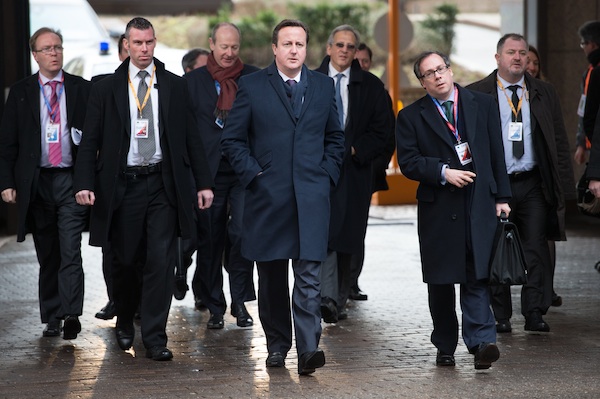This week David Cameron lectured a business audience in India on how far Britain has yet to go in getting women into the boardroom. ‘My wife likes to say,’ he said, ‘that if you don’t have women in 50 per cent of the top positions you are not missing out on 50 per cent of the talent, you are missing out on much more than 50 per cent of the talent.’
The irony seemed to be lost on him. Here was the leader of a government which preaches equality every bit as much, if not more, than Tony Blair’s Labour party: the law has been changed so that employers can use ‘positive discrimination’ to manipulate the gender and ethnic balance of their staff; universities have been bullied and threatened with loss of funding if they fail to reduce their intake from private schools.
And yet Cameron’s Cabinet and party have failed miserably to achieve the standards which he tries to impose on others. Never mind reaching the 50 per cent representation which he feels would be ideal, just four of Cameron’s 22-strong Cabinet are women. Far from luxuriating in their talents, he seems especially fond of sacking females who do make it in.
In last September’s reshuffle, Welsh Secretary Cheryl Gillan was sacked for her opposition to HS2. Caroline Spelman lost her job as Environment Secretary for no obvious reason, and Baroness Warsi was demoted from party chairman to a post outside Cabinet. Justine Greening was also demoted. There was also a notable sacking of Sarah Teather as an education minister. Not one of the fallen women received an honour, by the by, although four male ministers who left the government did.
As for the educational background of Cabinet ministers, God help any university which showed such a bias towards public school types. In Cameron’s first Cabinet, 14 out of 23 government ministers went to private schools. Just five went to comprehensives. After the 2012 reshuffle, the number of privately educated ministers fell by two, with the number of comprehensive-educated ministers rising by a pathetic one.
Now, of course, there might be perfectly good reasons why there are only four women and hardly any comprehensive-educated ministers in the Cabinet. The Prime Minister can only choose from what talent is available to him and if fewer women want to be MPs than do men, so what? None of the sacked women had exactly excelled themselves in office. If few comprehensive-educated pupils go on to fill the top positions in society, it doesn’t necessarily imply discrimination either. Maybe our schools aren’t educating people properly. Maybe state school pupils think politics is a dirty business.
I suspect that most Spectator readers will have a great sympathy for these arguments. But they are not arguments which David Cameron will accept — not in public in any case. You don’t hear him saying, ‘Oh, well, maybe fewer women than men want to be on the boards of FTSE companies — you can’t drag them into managerial roles.’ Rather, he lectures businesses on how brilliant women are at business, using his wife as an example, and hints that they are somehow guilty of inadvertent discrimination.
Tony Blair was no different. In 2004, his government bizarrely tried to impose 25 per cent female representation on the Iraqi transitional assembly — a target which he had been unable to reach with his own government. At the time, only five of his Cabinet were women.
His government went on to pass a whole raft of equality and diversity legislation, lumbering firms with punitive fines and costs for firing staff without first going through all the hoops: verbal warnings, written warnings and meetings attended by trade union representatives. Businesses were punished for falling foul of often dubious claims of discrimination by frustrated job applicants.
Yet Blair himself took no notice whatsoever of the rules he was happy to impose on others. When he wanted to fire an underperforming minister he didn’t go through that series of verbal and written warnings; he just picked up the phone and told them that their services were no longer required.
As for Blair, as for Cameron: equality and diversity are concepts for other people to observe. But since our leaders cannot seem to live with their own silly equality and discrimination laws, might it not be an idea to exempt the rest of us from them, too?







Comments